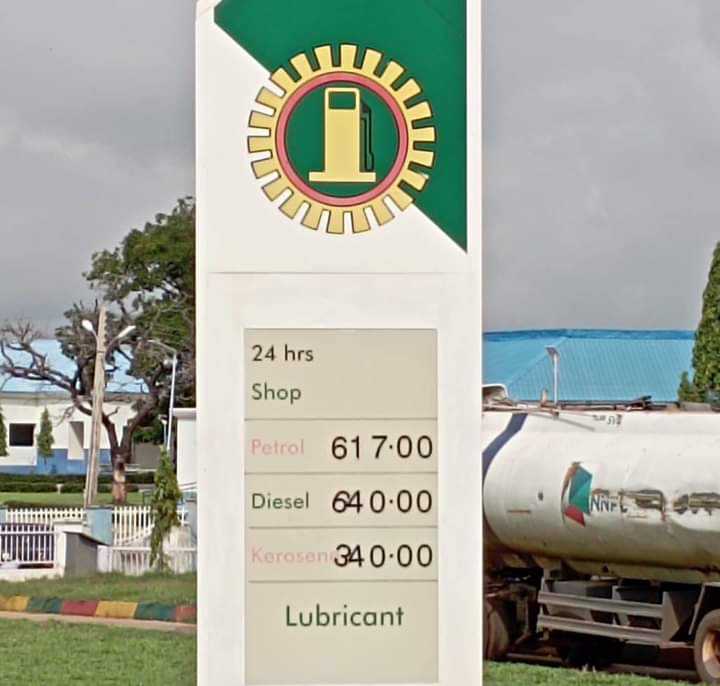Vehicular movements in most parts of Nigeria have continued to drop as many roads and streets are deserted with very few cars plying them, checks by Daily Trust have shown.
Millions of private and commercial vehicle owners have parked them at home even as traders and civil servants who could not afford high fares remained indoors with many of them saying they were waiting for a miracle to happen.
Those who spoke to Daily Trust said the development was the direct consequence of the recent hike in the price of petrol with a litre sold in major filling stations in Lagos at N568 from the previous N480-N490. The commodity is sold at N617 in the Federal Capital Territory (FCT) and higher in some places in the far North.
Kano
The number of vehicles on the major roads in Kano has nosedived compared to a couple of days before the latest hike.
- NIGERIA DAILY: Why Muslims Do Not Celebrate Islamic New Year
- Kaduna aggrieved APC chieftains decry ‘recycling’ political appointees, lack of reward
Only commercial tricycles were seen sparingly on major roads while the number of private vehicles has declined.
During a visit to the State Secretariat, housing most of the ministries and departments, it was observed that the number of vehicles being grounded has increased.
Even before the latest increase, Daily Trust had reported that majority of civil servants on the payroll of the state government said they could not use their vehicles for 30 days without grounding them to wait for their salaries.
The minimum wage for civil servants in the state is N30,600 with a full tank of an average private car (with 60 litre tank capacity) now costing over N37, 000.
The situation is similar or worse for business owners and artisans in the state.
A trader, Aminu Inuwa, said, “I have since stopped bringing my goods from the market with commercial vehicles due to the fare they are charging us. I have a tricycle and that’s what I now use to bring my goods to the shop even if it will take me three rounds to and from the market to bring everything down to the shop.”
A vehicle mechanic, Umar Hussain, said, “We only come to the workshop to chat and go home. We used to repair cars non-stop every day and even have to leave some for the next day; but now we are literally jobless.”
Lagos
Our correspondents who monitored the traffic situation in and around the Lagos metropolis, from Ojodu-Ogunnusi Road, Ikeja, Ojota, Lagos-Ibadan Expressway, and Tollgate down to the Third Mainland Bridge, report that there are very few cars on the roads.
As of 11:20am, the 3rd Mainland Bridge was completely free of traffic gridlock down to Ikoyi, Victoria Island, and Marina.
Also, reports from Agege-Pen Cinema, Iju Road, and Oba Akran Avenue indicated that roads were deserted with few cars seen plying the once bustling roads.
A Lagos resident, Alesh Akeem, who is an artist but could not leave his house, said, “The reason is very simple. I go to the Island virtually every day and before coming from the Island to the Mainland I used to buy N5,000 fuel which could take me like two to three days but now I have to buy N15,000 worth of fuel which might not last more than two days.
“If I have to go to work every day of the week, it is like N15,000 multiplied by four days which is N60,000 a week and N240,000 a month spent on fuel for transport only. You can’t even use any of the ride-hailing services; that is definitely not an option,” he said.
FCT
The increment is having negative consequences on social activities in the Federal Capital Territory (FCT).
Daily Trust observed that even though they have the product in stock, filling stations were virtually empty with only a few motorists patronising them.
Many residents said they decided to stay indoors, while others abandoned their private cars to board commercial vehicles.
It was observed that heavy traffic, which usually occurred during the peak periods in busy areas like Area 11, Wuse 2, Gwarimpa, Kubwa and Nyanya, among others, has fizzled away.
One of our reporters who visited the Federal Secretariat, Abuja, yesterday, observed that all the phases of the complex were virtually deserted.
This is evident in the parking space adjacent to the complex which is half occupied, and same thing in the different lobbies of the buildings.
Even the lifts which were usually stampeded by long queues were yesterday a ghost of their former selves. Our reporter was told that it is only high-level cadre staff and essential service staff that were coming to work regularly.
A mid-cadre staff member at the Federal Secretariat Phase I, Edward Emmanuel, said he would drop his car as he could no longer bear buying fuel from his salary.
“Yesterday I bought N10,000 fuel which was just 16 litres that only took me from my house to the federal secretariat and back home.
“What workers are going through now is more than excruciating. We cannot cope any longer. They (the government) should do something so that something will not happen,” he said.
Another staff, Ibrahim Abdullahi, told our reporter that based on his own estimate from their office, there was a significant reduction of staff reporting for work by more than 50 per cent.
“We now use what we call ‘local arrangement’ whereby some of us would come to work and cover for others. Even though this might work as a stop-gap measure, it will certainly affect productivity in the future,” he said.
When our reporter visited the office of the Head of Service of the Federation, he was told that he could not be attended to without prior arrangement.
But an official, who spoke off the record, said the government was aware of the situation. “Let me be frank with you, most of the thumb-in points that workers register their presence have been switched off.
“We feign ignorance to what is happening because there is nothing we can do. How can you punish an employee that the whole of his salary would not pay for his transport for the month?” he asked.
Many staff interviewed by our reporter were of the view that the government should revert to the status quo – the subsidy regime, adding that it should stay for a while until the refineries are fixed.
A trader in Kubwa, Halima Bello, said many people in her area had abandoned their vehicles at home due to the fuel price increment.
Meanwhile, in separate interviews with our correspondents, artisans spoken to said the situation was having negative effect on their businesses as they were now recording low patronage.
A hair stylist, Joy Enogieru, said, “It has not been easy. The epileptic power supply, coupled with the fuel hike, is slowing down the business. Sometimes, when customers want to do retouching and setting, if there is no light and I don’t have fuel in the generator due to the cost, I will just tell them to go somewhere else.”
Emeka Chukwudi, a barber, said: “The situation is really affecting my business because after increasing my barbing fee, quite a number of customers stopped coming to my shop. Before this administration came into power, I used at least N2, 000 fuel daily, but now it’s no longer the case.”
Borno
One of our correspondents who drove round Maiduguri, the capital city of Borno, observed a massive reduction of private vehicles on the major roads with only commercial tricycles were plying the roads.
Mustapha Ibrahim, the chairman of Gamboru Market Keke NAPEP operators, said the fuel increase has made life very difficult for them, and they could not see any relief in sight.
“A litre of fuel costs N630 but passengers are not willing to adjust to the increase in fares. Sometimes, you will fuel the bike and ride a long distance without getting a single passenger. You will burn the fuel and return home with nothing,” he said.
Alhaji Inuwa, a federal civil servant, lamented that his salary as a level 08/2 officer is less than N60, 000, and now spends N1,200 on transport to work daily.
“We want Zulum to also reduce the working days or find a way of relieving workers from the difficulty we are facing. I’m afraid that workers will soon start skipping offices if something urgent is not done,” he said.
A single mother, Sa’adatu Miringa, said with her meagre salary, she’s struggling to feed and take care of her transport fare to the office.
“I struggle to pay my children’s school fees, my transport fare and food. Things are just too much for me and the salary is too meagre,” she said.
FG insensitive, Ondo workers
Civil servants in the Ondo State, on Thursday, kicked against the increase in fuel pump price.
The workers, through their union, described the increase in fuel price weeks after a similar exercise was announced without any attendant palliatives as “wicked”.
Rising from an emergency meeting in Akure, the workers criticised the action of the President Bola Ahmed Tinubu-led federal government, stating that the administration had continued to be insensitive to the plight of the common man.
They stated this in a communiqué issued after the meeting signed by the NLC Chairman, Victor Amoko; secretary, Amos Sunday; TUC chairman, Clement Fatuase; Secretary, Gideon Bakare; JNC chairman, Ademola Adeniji and secretary, Adeleye Foluke Esther.
The workers resolved that the Ondo State government should as a matter of urgency roll out palliatives for them and the masses to ease the agonies inflicted as a result of the hike in the price of PMS.
“All outstanding salaries and allowances owed the workers of the state should be paid immediately,” they said.
NULGE demands 300% salary increment
Meanwhile, the Nigeria Union of Local Government Employees (NULGE), on Thursday, demanded an upward review of workers’ salaries by 300 per cent as minimum wage in both government and private sectors, saying that is the only way to cushion the present hardship in the country.
The union also demanded special rural allowances for workers across 774 recognised local government areas in the country while basic infrastructures are being put in place to encourage them to continue serving in the rural areas and to also discourage rural-urban migration.
NULGE President Ambali Olatunji, who stated this in Abuja in an interview with journalists shortly after the emergency National Executive Council (NEC) meeting of the union, also cautioned the federal government to judiciously utilise the $800m World Bank loan it secured.
“Considering the hardship brought about by the removal of fuel subsidy on local government staff, it is the position of NULGE that there should be a 300% rise in the minimum wage for all local government workers and other public servants including private sector workers,” he said.
From Abdullateef Aliyu (Lagos), Salim U. Ibrahim (Kano), Seun Adeuyi, Philip S. Clement, Dalhatu Liman, Idowu Isamotu, Muideen Olaniyi (Abuja) & Tosin Tope (Akure)

 Join Daily Trust WhatsApp Community For Quick Access To News and Happenings Around You.
Join Daily Trust WhatsApp Community For Quick Access To News and Happenings Around You.


